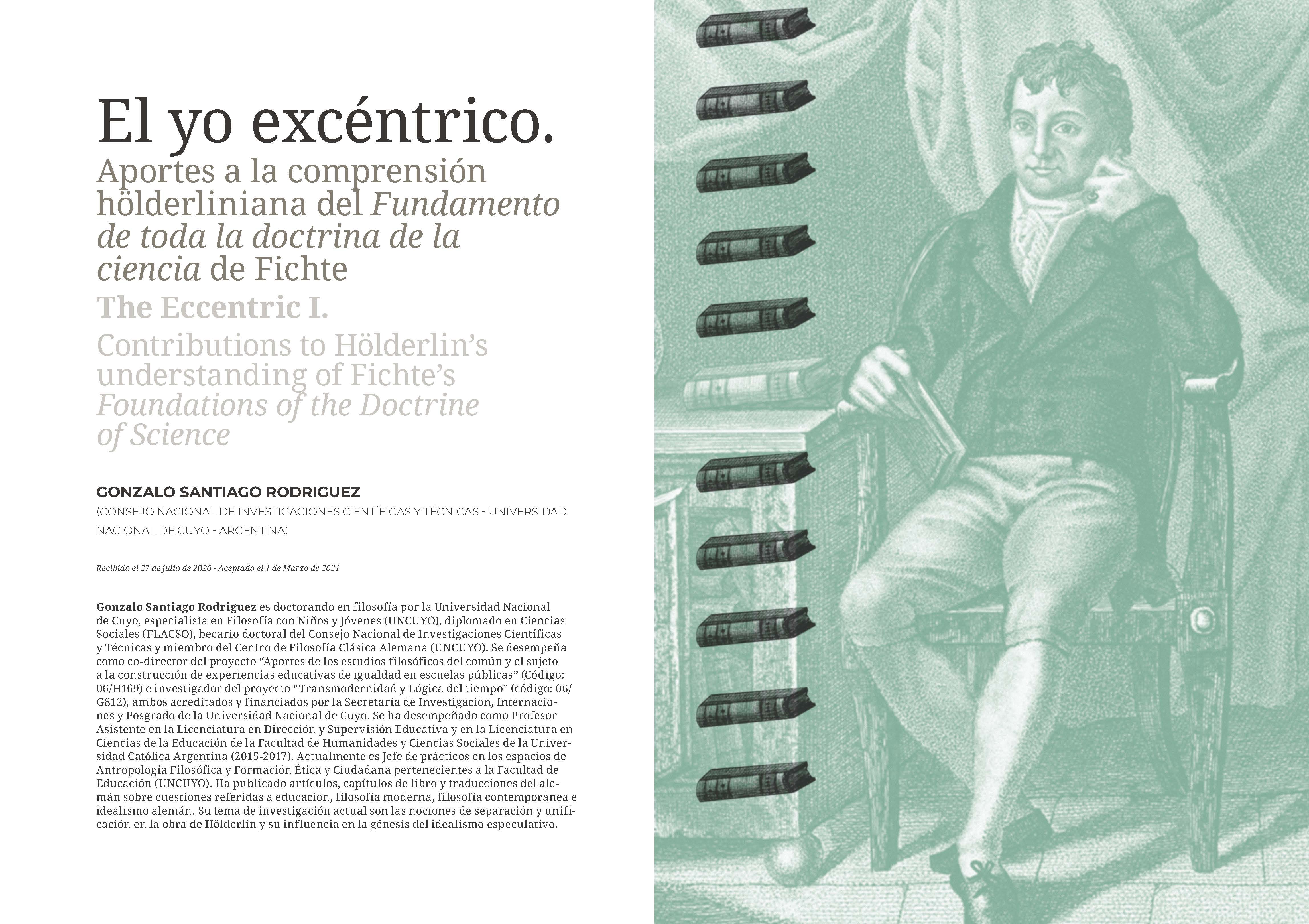El yo excéntrico
Aportes a la comprensión hölderliniana del Fundamento de toda la doctrina de la ciencia de Fichte
DOI:
https://doi.org/10.69498/ri.2022.15-16.51Palavras-chave:
Filosofía clásica alemana, Fichte, Hölderlin, SpinozaResumo
La importancia del juicio de Hölderlin sobre la obra de Fichte durante el período en el que el poeta permaneció en Jena (1794- 1795), constituye uno de los temas más tratados por la literatura especializada en el idealismo alemán. Por un lado, existe una tendencia a reconocer en Hölderlin una posición superadora del pensamiento fichteano, por el otro, el juicio del poeta es considerado como una mala interpretación. Sin embargo, la peculiar lectura de Hölderlin constituye hoy un terreno fértil para el debate. Basándonos en la comparación de las fuentes y de los textos nuestro trabajo buscará mostrar de qué manera la versión métrica del Hiperión presenta su propia solución al problema de la filosofía trascendental de finales del siglo XVIII. En la primera parte de nuestro trabajo (Titanomaquia) comprenderemos la importancia del pensamiento fichteano para Hölderlin, en la segunda parte (Círculo y centro) analizaremos la crítica del poeta a Fichte, en la tercera parte (Hipérbola y asíntota), exploraremos el modo en que Hölderlin asume el movimiento del Fundamento de toda la doctrina de la ciencia dentro de su obra temprana, y en la última parte (El yo excéntrico) intentaremos comprender de qué manera dicho movimiento es modificado por Hölderlin.
Downloads
Referências
Acosta, Emiliano, Schiller versus Fichte. Schiller Begriff der Person in der Zeit und Fichtes Kategorie der Wechselbestimmung im Widerstreit, Amsterdam-New York, Rodopi, 2011.
https://doi.org/10.1163/9789401206792
Böhm, Wilhem, "«So dacht'ich. Nächtens mehr». Die Ganzheit des Hyperion-Romans", en Hölderlin. Gedankenschrift zu seinem 100 Todestag, Tubinga, J.C.B. Mohr, 1943.
Boeder, Heribert, Die Letzte Epoche der Philosophie in ihrer Kern-phase, Berlín, Dunckel und Humboldt, 2016.
Dilthey, Wilhem, Vida y poesía, trad. de Eugenio Imaz, México, F.C.E, 1978.
Fichte, Johann Gottlieb, Doctrina de la Ciencia nova método, trad. José Luis Villacañas, Valencia, Natán, 1987.
---, Fichtes Werke I, ed. Immanuel Herman Fichte, Berlín, Walter de Gruyter & Co., 1971.
---, Fundamento de toda la doctrina de la ciencia 1794, trad. Juan Cruz Cruz, Buenos Aires, Aguilar, 1975.
Ferrer, Anacleto, La reflexión del eremita. Razón, revolución y poesía en el Hiperión de Hölderlin, Madrid, Hiperión, 1992.
Frischman, Bärbel, "Hölderlin und die Frühromantik" en Kreuzer, Johann (ed.), Hölderlin Handbuch, Stuttgart-Weimar, J.B. Metzler, 2011, pp. 107-116.
https://doi.org/10.1007/978-3-476-00659-2_12
Goethe, Johann Wolfgang, Werke I, Hamburger Ausgabe in 14 Bänden, Hamburg, Christian Werner Verlag, 1996.
Hegel, Hannelore, Isaac von Sinclair zwischen Fichte, Hölderlin und Hegel: ein Beitrag zur Entstehungsgeschichte der idealistischen Philosophie, Frankfurt am Main, Vittorio Klostermann, 1971.
Hegel, George Wilhelm Friedrich, y Schelling, Friedrich, "Correspondencia completa", traducción y notas de Hugo Ochoa y Raúl Gutiérrez, en Miscelanea Poliana [en línea], N°15, 2007, consultado el 12/03/2021. URL: http://www.leonardopolo.net/docs/MP15.pdf, p.8.
Henrich, Dieter, "Hölderlin über Urteil und Sein", en Hölderlin Jahrbuch, Tubinga, J. C.B. Mohr, 1965/1966, pp.73-96.
---, Der Grund im Bewußtsein Untersuchungen zu Hölderlins Denken (1794-1795), Stüttgart, Klett-Cotta, 1992.
Hölderlin, Friedrich, Correspondencia completa, trad. Helena Cortés y Arturo Leyte, Madrid, Hiperión, 1990.
---, Ensayos, trad. Felipe Martinez Marzoa, Madrid, Peralta Editores, 1976.
---, Hiperión. Versiones Previas, ed. Anacleto Ferrer, Madrid, Hiperión, 1989.
---, Poesía completa, ed. Federico Corbea, Barcelona, Libro Nuevo, 1977
---, Sämmliche Werke, Grosse Stutgarter Ausgabe, Stuttgart, W. Kohlhammer, 1954/1985.
Janke, Wolfgang, "Hölderlin und Fichte. Ein bivium zum unbekannten Gott (1794-1805)" en Maus, Albert, Transzendental Philosophie als System, Die Auseinandersetzung zwischen 1794-1806, Hamburg, Meiner, 1989.
Kepler, Johannes, El Secreto del Universo, trad. Eloy Rada García, Madrid, Alianza, 1992.
Profili, Lelia Edith, "Monismo e idealismo", en Mannina de Gamero, Liliana (ed.), Logos e historia. Las fronteras del presente filosófico, Mendoza, Edifil, 2017.
Reisinger, Peter, "Hölderlin zwischen Fichte und Spinoza. Der Weg zu Hegel", en Bachmeier, Helmut, Rentsch, Thomas (eds.), Poetische Autonomie? Zur Wechselwirkung von Dichtung und Poesie in der Epoche Goethes und Hölderlins, Stuttgart, Klett-Cotta, 1987.
Rivera de Rosales, Jacinto y Cubo, Óscar (eds.), La polémica del ateísmo. Fichte y su época, Madrid, Dykinson, 2009.
Ryan, Lawrence, Hölderlins "Hyperion". Exzentrische Bahn und Dichterberuf, Stuttgart, Metzler, 1965.
Safranski, Rüdiger, Romanticismo. Una odisea del espíritu alemán, trad. Raúl Gabás Pallás, Buenos Aires, Tusquets editores, 2012.
Serrano, Vicente, "Sobre Hölderlin y los comienzos del idealismo alemán", en Anales del seminario de historia de la filosofía, N°10, 1993, pp. 173-194.
Solé, María Jimena, El ocaso de la ilustración. La polémica del spinozismo, Bernal, Universidad Nacional de Quilmes, 2013.
Tammineaux, Jacques, "Hölderlin en Jena", trad. María del Rosario Acosta, en Ideas y Valores, N° 28, Agosto del 2005.
Tilliete, Xavier, "Schelling", en La filosofía alemana de Leibniz a Fichte, Madrid, siglo XXI, 1984.
Waibel, Violetta, "Fichte" en Kreuzer, Johann (ed.), Hölderlin Handbuch, Leben, Werk, Wirkung, Stuttgart-Weimar, J.B.Metzler, 2011, pp.94-104.
---, Hölderlin und Fichte 1794-1800, München, Paderborn, 2000.
Wegenast, Margarethe, Hölderlins Spinoza-Rezeption und ihre Bedeutung für die Konzeption des »Hyperion«, Tübingen, Niemayer, 1990.

Downloads
Publicado
Como Citar
Edição
Seção
Licença
Copyright (c) 2022 Gonzalo Santiago Rodriguez

Este trabalho está licenciado sob uma licença Creative Commons Attribution-NonCommercial-ShareAlike 4.0 International License.








